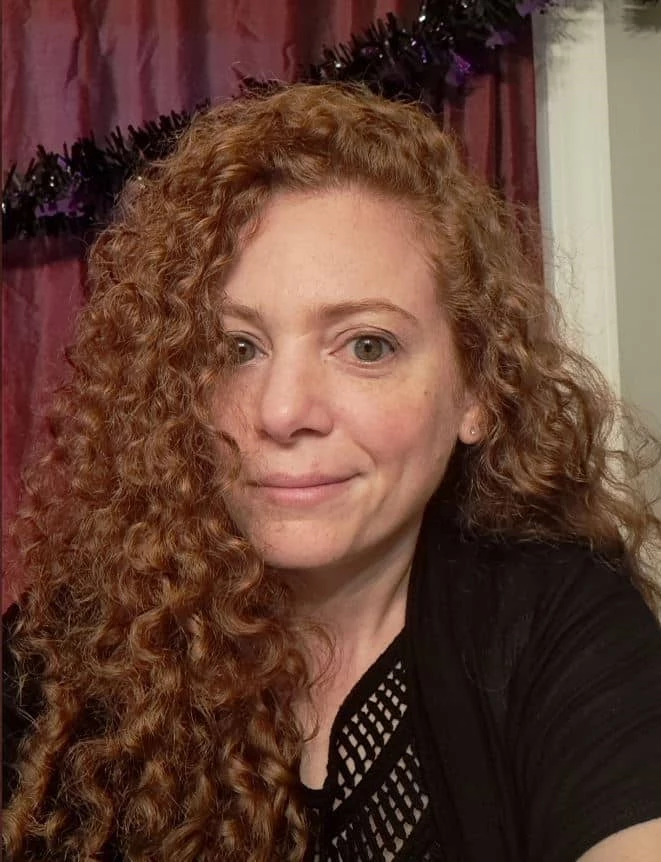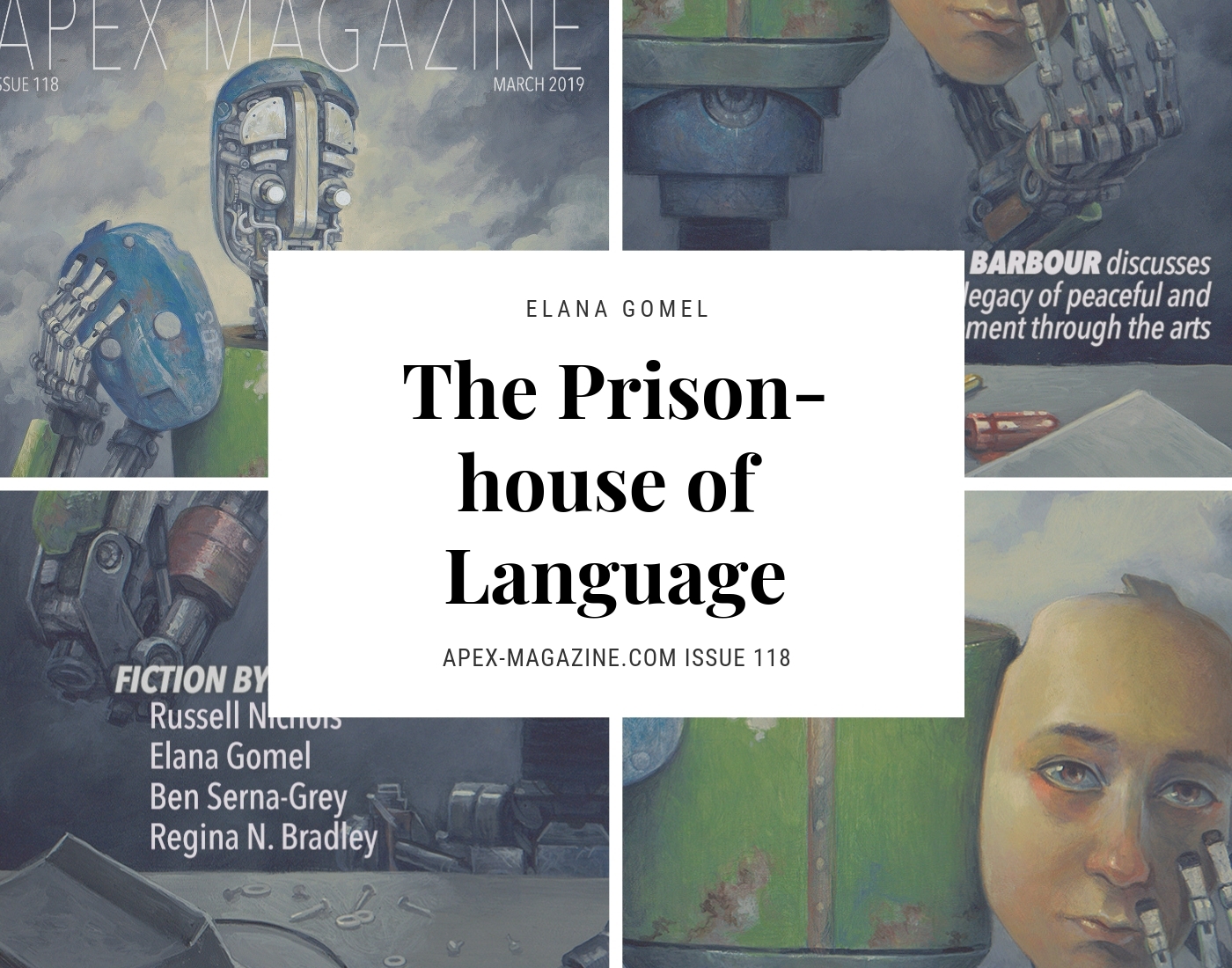
My first thought when I started reading this story was Did Jason send me a non-fiction piece by accident? followed by Did Jason send me a non-fiction piece on purpose? followed immediately by Damn, this story pings everything for me. I was struck by the physical manifestations of sounds; I was floored by the how the protagonist describes her experiences with verbal communication.
I am fascinated by language and communication, the idea that our words trap us into particular modes and methods of communication, the idea that you can use pages upon pages of words and never actually say anything at all, the idea that spoken language is surprisingly limited, and that is why we have poetry and music. A large vocabulary gives you more freedom to express yourself, but you will still be limited by the rules of grammar, the laws of punctuation, the red-penned run-on sentence.
What if those limits didn’t exist? What if we were able to communicate, free of the shackles of grammar and Oxford commas, free of what a paragraph or a sentence is supposed to look like? What if our addiction to the formal laws of language was holding us back as a species? What if we could walk ourselves right out of these limitations?
Elana Gomel’s “The Prison-House of Language” has echoes of Samuel Delany’s Babel-17 and the 2016 film Arrival (which was based on the 1998 novella Story of Your Life by Ted Chiang), and then goes off on a completely different and just as incredible direction, with a protagonist for whom syllables are tangible in their color, shape, taste, and physical effect on her body. Some words taste wonderful, others cause her pain or anguish. To better understand how to navigate a world that is incapable of understanding her inner life, she becomes a linguist.
Within the confines of “The Prison-house of Language,” Gomel’s characters discuss the Sapir-Whorf hypothesis, the earliest human proto-language, and ask the question, what triggered early humans to develop a spoken language? Did the beginnings and evolution of language help us understand our place in the universe, or separate us from the universe?
I hope you enjoy this story as much as I did, and I hope it inspires you to begin a discussion about all the amazing things language allows us to do, and ask questions about the ways in which spoken language limits us.
The only hint I’ll give you regarding the plot is, when a woman of few words suddenly becomes loquacious, it’s time to worry.
Elana Gomel has some experience with language herself. Born in Russia, she currently shares her time between California and Tel Aviv, Israel, and she speaks Russian, Hebrew, and English. The author of over forty pieces of speculative fiction, her work has appeared in New Horizons, Timeless Tales, Alien Dimensions, New Realms, and in the anthologies The Apex Book of World Science Fiction Vol 4, People of the Book, Zion’s Fiction, andInk Stains, among others. She is the author of the novelsThe Hungry Ones and A Tale of Three Cities. Most recently, her novella Dreaming in the Dark was published in 2017. She has also published academic books and dozens of academic articles, many of which focus on narrative theory and post-humanism. A lover of travel, she enjoys immersing herself in the cultures, histories, and present-day struggles of the places she is visiting.
APEX MAGAZINE: I am unknowledgeable of, but quite fascinated by language, verbal vs. non-verbal communication, and generally how communication works. In this story, you touch on the Sapir-Whorf hypothesis, Noah Chomsky’s linguistics research involving genetics, and the question of how did something as complicated as a spoken language even evolve? Talk me through what inspired you to write this story.
ELANA GOMEL:I am trilingual. I speak Russian, Hebrew, and English. And I have a different persona in each of these languages. I dream in English, but sometimes my mother’s voice speaks to me in Russian in a dream, and I wake up as the person I could have been had our family stayed in my birth-land. So, I have always been fascinated by how language affects personality. The Sapir-Whorf hypothesis is one way to explain this influence: basically, it states that different languages shape the way different cultures experience the world. There has been a lot of controversy about it, but I tend to think that there is something to it. Language is like lenses that have molded themselves to your eyes and filter every image that comes through. You don’t notice them because this is how your vision has always been. But what if you could take them out? What wonders—or terrors—could you see? This is what my story is about.
AM: How much research did you have to do for this story? What was the most interesting piece of information you came across?
EG: I did quite a bit, looking at the debate about the origin of language. My most interesting discovery was purely negative: nobody knows. There are all kinds of theories about the evolutionary development of language, but they are speculative. All languages spoken today have the same deep structure and are equally complex. You can take a baby from Norway and teach him Chinese, and he’ll be as fluent as any native speaker. But despite all the hyped-up stories, you can’t teach a chimp or a dolphin to use sign language in the same way as a human being. They’ll be able to communicate, up to a point, but not to use complex syntax or tell stories. So, how did we come to possess this marvelous ability that makes us what we are? This is one of the fundamental mysteries of science, on a par with the question about the origin of the universe. And nothing is as fascinating as a good mystery.
AM: Sophia has a special gift for learning languages, a gift for understanding the foundation of how and why language works. The rest of us aren’t so lucky. Do you have tips for people who want to better understand the foundation of language, or just learn another language?
EG: I don’t actually have this facility myself. Some people can learn a new language in a matter of weeks, but not me. My multilingualism is pure happenstance, created by my life circumstances. My love affair with English goes back to my childhood, when I first started reading science fiction. I always felt like an alien in the country where I was born, and English, to me, was the language of real aliens. For Sophia, every language is like this. She speaks all of them, but none are natural or easy. Maybe to learn a new language, you have to step back from it. Being a stranger is hard, but also rewarding. If you are at home nowhere, you are at home everywhere.
AM: The concept of spoken language had to come from somewhere; that’s how we got to where we are today. Where do you think spoken language is going? In a few thousand years, what do you think will have changed?
EG: With AIs and online communication, I think we’ll have a kind of merging of natural and computer languages. Even today, we have algorithms that help you to answer your email or post on social media. There will be much more of this kind of thing in the future. Some people find it disconcerting, but I actually like it. It brings home that alien quality of language I am so fascinated with. Language is not a transparent medium for expressing your thoughts. It speaks us as much as we speak it. As long as we are human, language will colonize our brains—and eventually, the electronic brains of our computers as well. The question, then, will be: if an AI can speak as well as I do, is it as human as I am?
AM: You recently attended Darkness 2019, which is one of the more unique literary conferences I have read about (fitting, since the conference is in Svalbard, a unique and very dark location). What is your favorite part of attending events like these?
EG: I am writing this in Oslo, where I came from Svalbard after five days of night. Oslo is part of our familiar world (albeit rather cold and gloomy). Svalbard is a different planet. The conference remains as vivid in my memory as a fever dream. Black velvet spangled with gold. The conference was excellent, but I believe that for every participant, it was a transformative experience beyond the academic payoff. Naturally, I am already trying to translate this experience into a story. A year ago, I wrote a fantasy novella, Dreaming the Dark, inspired by Inuit mythology. Perhaps I’ll go back to it. Or perhaps I’ll find another way to speak the darkness.
AM: What are some of your favorite themes to write about? Does your academic research inform your fiction writing, or vice versa?
EG: Aliens fascinate me, and always have. The Fermi paradox is what I keep coming back to: the universe is vast, and there must be intelligent life out there. So, where are they? I wrote an academic book about aliens in science fiction, trying to understand why we are obsessed with creatures whose very existence is in doubt. “The Prison-house of Language” is an attempt to answer the same question through fiction. All in all, I prefer fiction, though academic writing comes easier to me.
AM: You live in California and teach in Israel. How does that commute work? (I will never again complain about my one-hour commute!)
EG: Honestly, you don’t want to know. I decided that my future memoir will be titled Jet-lag as a Way of Life.
AM: Do you have any current projects or forthcoming publications you can tell us about?
EG: I just published a new novel called The Hungry Ones, and I’m very excited about it. It is not SF, but rather a dark fantasy about a living city that hides a devastating secret and a woman who uncovers it while coming to terms with her own terrible past. It is about redemption and memory—both individual and collective. All fantasy is rooted in history, but I am trying to go beyond the medieval past and explore the dark echoes of the last century. I think we are only now beginning to understand what a catastrophic and transformative century it was: revolution, genocide, two world wars, the atomic bomb, the beginning of the climate change … It is time for speculative fiction to transform our image of the twentieth century in the same way Tolkien transformed our image of the Middle Ages. This is also the subject of another project I am pursuing: a fantasy set in the USSR that never was.
AM: Thanks, Elana!









